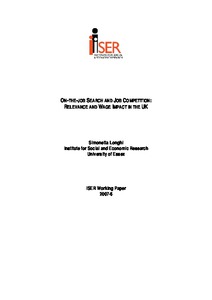On-the-job search and job competition: relevance and wage impact in the UK
"In the literature job competition is often measured by the unemployment rate. By neglecting on-the-job search, however, the unemployment rate is likely to be a biased measure of job competition: various studies have suggested that on-the-job search varies over time and across groups of people,...
| Main Author: | |
|---|---|
| Institution: | ETUI-European Trade Union Institute |
| Format: | TEXT |
| Language: | English |
| Published: |
Colchester
2007
ISER |
| Subjects: | |
| Online Access: | https://www.labourline.org/KENTIKA-19180117124919083999-on-the-job-search-and-job-comp.htm |
| Summary: | "In the literature job competition is often measured by the unemployment rate. By neglecting on-the-job search, however, the unemployment rate is likely to be a biased measure of job competition: various studies have suggested that on-the-job search varies over time and across groups of people, and might have a relevant impact on the outflow from unemployment. In the UK on-the-job search is a relevant phenomenon: around half of people who are actively looking for a job are employed. This paper estimates the direct impact of job competition on individual wages in the UK using data from the quarterly Labour Force Survey over the period 1993-2005. Measures of job competition based only on the unemployment rate are compared to measures that account for on-the-job search as well as inter-regional commuting. The results suggest that failing to correctly measure labour supply and demand leads to biased estimates of the wage impact of job competition, and that estimations focusing on certain sub-groups of the population (e.g. graduates or women) might be affected by larges biases." |
|---|---|
| Physical Description: | 19 p. Digital |

